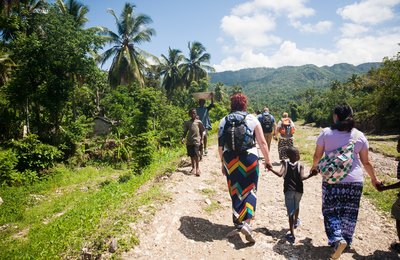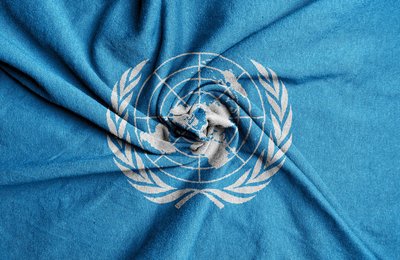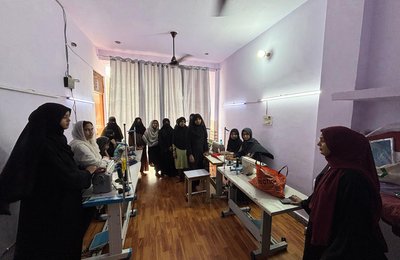Research this month
Righting the wrong: Strengthening local humanitarian leadership to save lives and strengthen communities
If we are to save more lives, the international humanitarian system must be turned on its head by shifting more power and resources to local actors.
Righting the wrong, from Oxfam, calls for a rethink of the international humanitarian system to place more emphasis on local capacity. By giving greater attention to locals, the report argues, aid is more likely to be based on local needs and priorities leading to more effective humanitarian aid.
Inside Syria: what local actors are doing for peace
The two peacebuilding priorities that were commonly mentioned by nearly all respondents irrespective of their location, affiliation, or main activities were: i) ending the violence and foreign military interventions; and ii) starting a national dialogue
Inside Syria, from Swisspeace, maps local peacebuilding actors involved in the Syrian conflict. Based on 143 interviews with local leaders in Syria and Lebanon, the study provides a picture of the local peacebuilding initiatives active in Syria and the particular challenges facing peace in the country.
Investing in Iraq’s Peace: How Good Governance Can Diminish Support for Violent Extremism
This research finds that recent citizen-oriented governance investments such as civil society programs are beginning to demonstrate impact: public confidence in civil society is rising, creating an opportunity that must be seized.
Investing in Iraq’s Peace, from Mercy Corps, examines the factors behind violent extremism in Iraq and challenges the widely held assumption that sectarianism is the main cause of radicalisation and conflict. The report highlights the importance poor governance in driving conflict and the role local civil society plays in improving the situation.
Political parties and peacebuilding
Political parties can play a powerful role in advancing peace, as they have done at times in Nepal, or in blocking it, as the SLFP and smaller Sinhalese nationalist parties did in Sri Lanka. It is therefore vital that international actors strengthen engagement with them.
Political parties and peacebuilding, from NOREF, looks at the role political parties play in peacebuilding. Taking three countries as case studies, Sri Lanka, Nepal, and Myanmar, the paper shows both the positive and negative influence political parties can have in peace processes. And yet, despite their potential contribution to peace, support to political parties has often been neglected.
A Community of Peoples: Bottom up Regional Integration in the Horn of Africa
While the track record and prognosis for formal economic integration in the IGAD may appear bleak, this is only one side of the picture. There are dynamics that are often overlooked, which show that the IGAD region is actually even more integrated than captured by conventional measures of integration.
A community of peoples is the latest edition of the Life and Peace Insititute's Horn of Africa Bulletin. The publication brings together a series of articles looking at grassroots and informal examples of regional integration in the Horn of Africa. Subjects include economic activities of the Somali diaspora in Kenya, regional approaches to reconciliation, and the role of civil society in the East African Community.
From the blog
The Tunisian revolution, five years on
 By Nissaf Slama: In November 2015, a quartet of Tunisian civil society organisations were awarded the Nobel Peace Prize. Nissaf Slama reports. Read more »
By Nissaf Slama: In November 2015, a quartet of Tunisian civil society organisations were awarded the Nobel Peace Prize. Nissaf Slama reports. Read more »
The case of Dominic Ongwen: perpetrator and victim?
 By Stephen Oola: In a video interview Stephen Oola discusses the important questions that arise from the war crimes trial of LRA commander Dominic Ongwen. Read more »
By Stephen Oola: In a video interview Stephen Oola discusses the important questions that arise from the war crimes trial of LRA commander Dominic Ongwen. Read more »
Dreaming of the future in Colombia
 By Ariel Safdie: Ariel Safdie says Colombians must break the cycle of violence to ensure a new peace deal succeeds. Read more »
By Ariel Safdie: Ariel Safdie says Colombians must break the cycle of violence to ensure a new peace deal succeeds. Read more »
Ethiopia likely to see further riots and deaths without genuine reform
 By Martin Home: Martin Home discusses how the political situation in Ethiopia has led to recent outbreaks of violence. Read more »
By Martin Home: Martin Home discusses how the political situation in Ethiopia has led to recent outbreaks of violence. Read more »
The challenge among us: getting to grips with lynchings in Guatemala
 By Matt Klick: Matthew Klick discusses the causes and consequences of lynch violence in Guatemala. Read more »
By Matt Klick: Matthew Klick discusses the causes and consequences of lynch violence in Guatemala. Read more »
Forgiveness in the aftermath of atrocities: the case of north Uganda
 By Stephen Oola: Stephen Oola explains the vital role forgiveness has played in low-level post-conflict reconciliation and peacebuilding in northern Uganda. Read more »
By Stephen Oola: Stephen Oola explains the vital role forgiveness has played in low-level post-conflict reconciliation and peacebuilding in northern Uganda. Read more »
Reintegrating former-LRA combatants after the Amnesty Act
 By Stephen Oola: How successful was the reintegration of former-LRA combatants after Uganda’s Amnesty Act in 2000? Read more »
By Stephen Oola: How successful was the reintegration of former-LRA combatants after Uganda’s Amnesty Act in 2000? Read more »
The Amnesty Act (2000): pragmatism or forgiveness?
 By Stephen Oola: What motivated the Ugandan government to offer amnesty to 26,000 former combatants? Read more »
By Stephen Oola: What motivated the Ugandan government to offer amnesty to 26,000 former combatants? Read more »
The ICC and alternative justice in Uganda
 By Stephen Oola: Is it enough for former LRA commanders to stand trial in the Hague? What about alternative forms of justice? Read more »
By Stephen Oola: Is it enough for former LRA commanders to stand trial in the Hague? What about alternative forms of justice? Read more »
The mismanaged war on the LRA and the involvement of the ICC
 By Stephen Oola: Why has it proved so difficult to defeat the LRA? Stephen Oola discusses the causes of conflict and peace in Uganda and beyond. Read more »
By Stephen Oola: Why has it proved so difficult to defeat the LRA? Stephen Oola discusses the causes of conflict and peace in Uganda and beyond. Read more »
A short history of the LRA until 2015
 By Stephen Oola: The LRA captured global headlines during the Kony 2012 campaign – but what has happened since? Read more »
By Stephen Oola: The LRA captured global headlines during the Kony 2012 campaign – but what has happened since? Read more »









